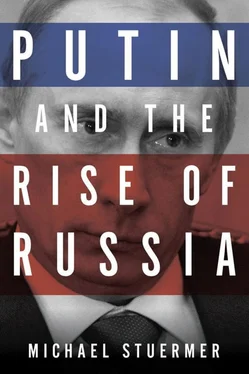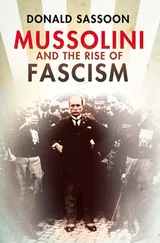But, inevitably, the survival of the fittest unleashed in and around the Kremlin put Putin in the thick of the battle. Who would be heir to Yeltsin? Luzhkov, or General Lebed, or Chernomyrdin, or Chubais? Putin managed to be an insider when it came to influence and control but remained an outsider when it came to corruption. This was to help him a few years later when scandal erupted in the Kremlin. He was a rare exception as, throughout those years, he was not suspected to have channelled state funds in his own direction.
In the Kremlin administration Putin was both an insider and an outsider. An outsider as he was not part of any of the established Moscow clans. And an insider, as he had made himself indispensable in his responsibilities for the Kremlin’s national and international assets.
In 1996 Yeltsin was reelected as president, but the economy went from bad to worse. Chernomyrdin, prime minister at the time, followed advice from the International Monetary Fund and tried to curb inflation, finance the country through hydrocarbon exports and rein in the powerful monopolies controlling the economy, sharpening the tools of the tax authorities, drawing down industrial subsidies and encouraging private investment and private enterprise. While all of this looked virtuous in the eyes of the West, it did not work in Russia. In early 1997 Russia’s coffers were empty and the country was facing serious trouble, even upheaval. Pensions and wages could not be paid. The country was close to paralysis. To make matters worse, the price of oil began to slip and, from mid-1997, plummeted due to a slight recession in the Far East. China’s rise had, ever since the early 1990s, sucked up any surplus oil in a market which provided little room for manoeuvre: a slight increase in demand would send prices up, a slight decrease would send prices down. In early 1998 prices reached rock bottom, and so did Russia’s economy.
In this situation Yeltsin concentrated power around Chubais and Nemtsov, the first as prime minister and the latter as his deputy, who at the same time were to balance each other. Valentin Yumashev, a journalist and former ghostwriter for Yeltsin, became head of the Kremlin administration – his chief qualification for this key post being both his liaison with Yeltsin’s daughter Tatiana and his close relationship with Berezovsky and the latter’s journal Ogonek . Putin, by now forty-four years old and a KGB colonel on the reserve list, was promoted on the Kremlin chessboard. A presidential ukas dated 26 March 1997 made him the successor to Kudrin as deputy director of the presidential administration and head of financial controlling. By now he was one among twenty heads of department in the Kremlin’s hierarchy, a lone wolf, inconspicuous, knowledgeable, indispensable, efficient and very smart. He now knew everything worth knowing about the cloak-and-dagger world inside the Kremlin, while keeping a distance from it. He seems to have been seen by the President and the ‘family’ as an engineer of power, but one who did not aspire to assume supreme control.
This trust in his modesty brought him a further appointment. In order to combat organized crime, and especially large-scale financial misdemeanour, Yeltsin set up a commission of the National Security Council whose powers stretched right across all branches of the state bureaucracy. The deputy secretary of the National Security Council was none other than Berezovsky. Putin was charged to look into the strange business practices of the number one arms corporation still unchanged since Soviet times. The report he produced caused one of the major storms of the second Yeltsin administration. He had found out that top managers had illegally sold weaponry to Armenia and embezzled vast sums earmarked for soldiers’ pay. Putin was upset when he discovered that his top-secret report was making the rounds. Life in the struggle against organized crime became complicated, more than a little dangerous and frustrating. A few years later, Putin hinted that for a while he had considered leaving the Kremlin’s service and setting up a consultancy for foreign direct investment in Russia – not a bad idea taking into account his linguistic abilities, his political connections, his St Petersburg experience and his invaluable insight into the real mechanisms of Russia’s economic life. At the time a wave of privatization was set in motion. But instead of benefiting the ailing Russian state budget the controlling stakes were divided among cronies of the Kremlin, most of the beneficiaries emerging as the new race of post-Soviet oligarchs. Putin had no visible part in those transactions, but he was among the few who knew the key players and understood the rules of the game, and he did not like what he saw.
Instead of trying his luck in the rapidly expanding private sector, Putin remained within the Kremlin’s high red-brick walls. While the economy was continuing on its slide, Yeltsin’s health was seriously declining, due in part to his unstoppable love for vodka. The looming question for the ‘family’ was how to make sure that Yeltsin’s concept of reform could somehow be carried on and how the family fortune could be secured against painful questions once the presidential mantle had been passed on to a successor. Neither Luzhkov, the mayor of Moscow, nor Zyuganov, the leader of the communists in the Duma, seemed to be desirable as successors to Yeltsin who, irrespective of his bouts of heavy drinking and his sometimes uncontrolled behaviour, was not only the man who had given democracy a chance in post-Soviet Russia and secured amicable relations with the West but who had also brought many men into positions of power that they did not want to lose – Putin among them.
Yeltsin appointed 35-year-old Kiriyenko to the post of prime minister, much to the approval of the people, who seem to have liked the successful, open and honest young manager – but who was, unfortunately, a stopgap and a lightweight.
One month after Kiriyenko had formed a government, Putin moved a step higher on the ladder of power. He was appointed First Deputy Head of the presidential administration which was taking away more and more executive power from the government. Most importantly, he had to arbitrate in the miners’ strike that threatened to spin out of control when the miners blocked the tracks of the Trans-Siberian railway and insisted on being paid the wages that they had not received for months. Kiriyenko, with the help of Putin, managed to calm down the furore.
Putin also had to supervise the Russian regions, eighty-nine different ‘subjects of the federation’ altogether, some of them aspiring to autonomy from Moscow. He built close ties with Yumashev, head of the presidential apparat and confidant of Berezovsky, and secured permanent access to Yeltsin – a key factor in a highly personalized struggle for power, with an ailing Yeltsin on one side, hungry wolves on the other. What he did was to bring his own friends as ‘cadres’ into key positions. Most of them were friends and colleagues whom he knew from his St Petersburg days and whom he could trust against the Moscow clans. Notable among those friends was Nikolai Patrushev, who later became the chief of the FSB. They had known each other since 1975, never lost contact and were mutually indispensable. Patrushev in the 1990s had risen to be head of counter-espionage in the FSB. Thereafter he became chief of human resources. For Putin, Patrushev’s expertise in all matters of importance for the FSB made him a trusted adviser, but also a mentor who conferred, if there was any need, the FSB mindset on the rising dark star.
Meanwhile, the oil price continued to plummet, revenue declined steeply and Russia’s financial situation went from bad to worse. The overall state debt amounted to USD 200 billion, with 44 per cent of the budget going on interest payments, most of them abroad. The Central Bank offered high interest rates to stem the flood of capital leaving the country. Tax receipts remained far behind the interest due. Currency reserves shrank to no more than USD 15 billion. On the stock exchange star performers like Gazprom and Lukoil lost half their value within weeks. While the government was paying hardly any wages or pensions, the population at large paid no taxes. The tax bureaucracy took its revenge by enforcing authentic statistics, book-keeping and regular payments. Major companies were threatened with confiscation if they did not pay up. The government was struggling against financial clans as well as regional rulers. It was a desperate situation, with no rise in the oil price in sight.
Читать дальше











